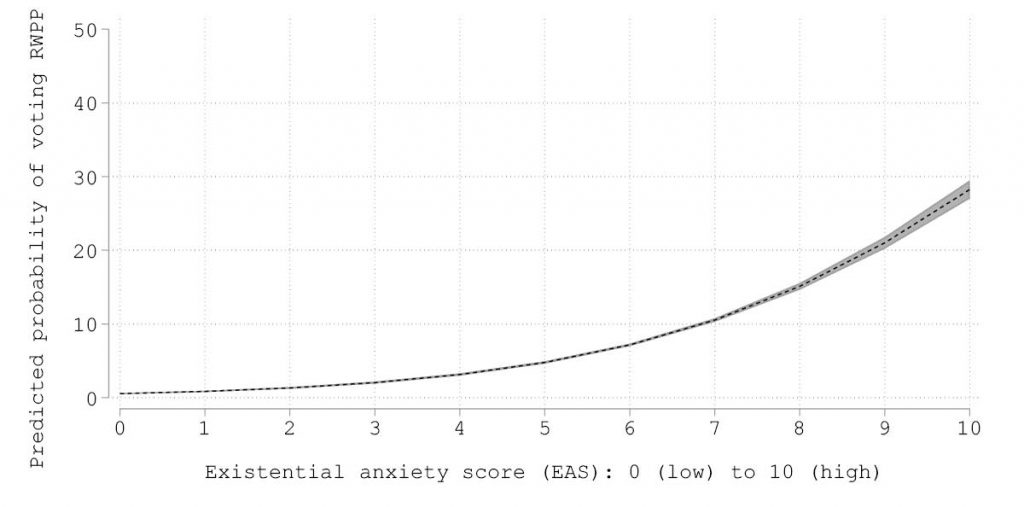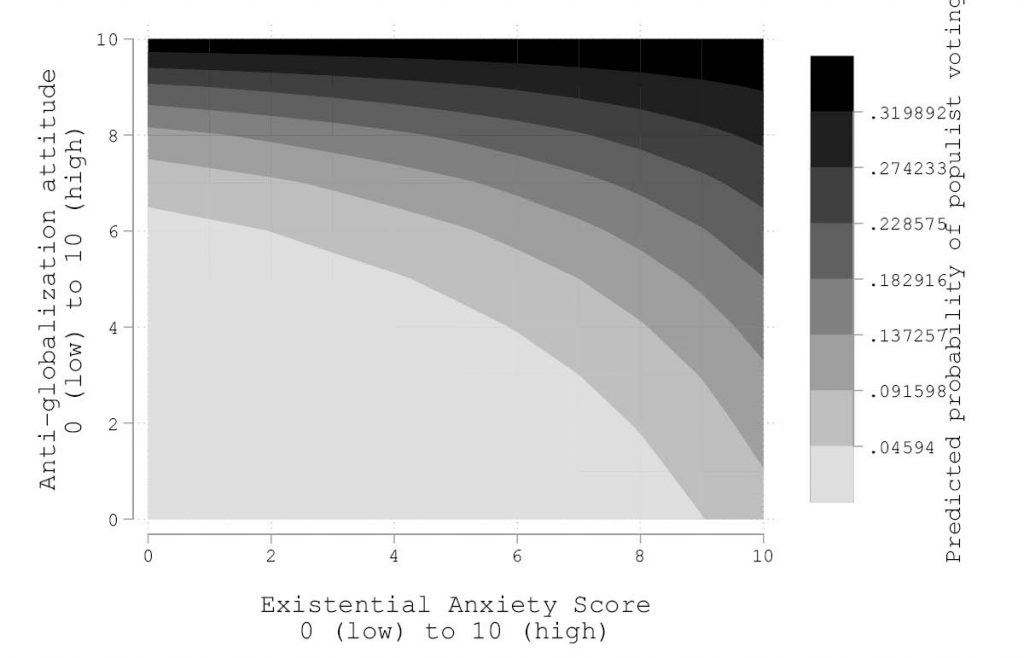Globalisation, and its many uncertainties, shape our modern world. One might assume, therefore, that people worried about global issues would vote for anti-globalisation parties. Anne Metten and Michael Bayerlein reveal a surprising twist: it's not those who have strong views on globalisation who support anti-globalisation right-wing populist parties
Why have right-wing, anti-globalisation populist parties gained increasing popularity in recent years? This pressing question is one with which academia and society are currently grappling. Populist parties tend to oppose migration, EU integration, and globalisation in general. Much existing literature suggests that individual affectedness by these processes is a predictor of voting for right-wing populist parties. But recent studies show that globalisation processes affect only moderately some who support right-wing populist parties. What's more, these people are not necessarily economically insecure.
Why do individuals seemingly unconcerned by globalisation support anti-globalisation right-wing populist parties?
This paradox prompts the question: why do individuals seemingly unconcerned by globalisation support anti-globalisation right-wing populist parties? In search of an answer, we have taken up a new perspective that looks at populism research through the lens of ontological security. This concept revolves around individuals' sense of identity and security amid rapid societal change. People are affected most strongly when they perceive that the state is unable to shield them from these changes.
Conventional explanations for right-wing populist support focus on negative globalisation attitudes, economic vulnerabilities, and cultural fears. Our perspective introduces existential anxieties as a compelling factor.
Our notion of existential anxiety has its roots in the concept of ontological security. Trust in the stability of one's identity, and in the stability of society, strongly influences a person's psychological well-being. The erosion of this trust, often caused by technological, economic, and societal change, results in ontological insecurity. In the context of globalisation, this insecurity emerges from the perceived disruption of traditional norms and identity markers.
Right-wing populists exploit people's existential anxieties by peddling crisis narratives
People with existential anxieties do not inevitably lend their support to right-wing populist parties. Yet these parties exploit people's anxieties, through crisis narratives and securitisation strategies. This is why even those who do not overtly oppose globalisation may find themselves drawn to right-wing populist parties. Unlike status anxieties and authoritarian values, existential anxieties are caused by societal changes and an individual’s struggle to maintain their identity.
Existential anxieties do not, however, explain every vote cast for right-wing populists. Some voters may support these parties because of their anti-migration stance or nationalist policy preferences. What we address here is the group of voters with only moderate globalisation attitudes. These voters, our research shows, are ripe for being won over by a right-wing populist mobilisation strategy. Through strong leadership and a reorientation to nationalist policies, right-wing populists appeal to existential anxieties by emphasising the urgent need to shelter the individual and protect societal identity.
Voters with only moderate fears of globalisation are ripe for indoctrination by right-wing populists
Two key implications emerge from this. Firstly, higher levels of existential anxieties correlate with a greater likelihood of voting for right-wing populist parties. Secondly, and more intriguingly, the correlation between existential anxiety and right-wing populist party voting should be higher when anti-globalisation attitudes are moderate. This is because right-wing populist parties have the steepest mobilisation curve among voters who do not yet have a cohesive worldview and do not, in any case, vote for right-wing parties.
To test these arguments, we constructed a novel tool: the Existential Anxiety Score (EAS). Our analysis is based on 2004–2018 data from the European Social Survey. The EAS assesses the two dimensions of existential anxieties. The exogenous dimension measures the need for security and stability. The endogenous dimension evaluates trust in political elites' capability to ensure security. Our analysis provides compelling insights into the increasing support for anti-globalisation, right-wing, populist parties. According to our findings, right-wing populist voting is not driven primarily by fear of globalisation. Rather, it is driven by the influence of existential anxieties.

This graph shows how strongly the EAS correlates with voting for right-wing populist parties (RWPP). In detail, an increase in the EAS by 1.5 from 6 to 7.5 points corresponds to a rise in the probability of supporting these parties from 7% to 13%. When the EAS increases by 1.5 points, from 7.5 to 9, the probability increases from 13% to 21%. This underscores the significant role that existential anxieties play in shaping political choices, with an increasingly strong correlation across different levels of existential anxiety.
We also find that the impact of existential anxiety on right-wing populist voting is most pronounced among individuals with moderate anti-globalisation attitudes. This intriguing finding challenges the common assumption that only strong anti-globalisation advocates would be drawn to such parties. Instead, it shows that these parties are attractive to people with more complex policy preferences.

To read the above figure, just choose a level of anti-globalisation attitude, follow it horizontally to EAS, and see how it affects the likelihood of voting for right-wing populist parties. The interesting part is in the middle: when you have a moderately anti-globalisation stance around 5, the chance of voting for right-wing parties goes up by 15 percentage points, as EAS increases from 1 to 10. This is where the mix of moderate anti-globalisation views and strong existential anxieties has the most impact in driving people to vote for right-wing populist parties.
In a world that's changing rapidly, understanding what shapes our political choices is an ongoing challenge. The unexpected link between existential anxiety and support for anti-globalisation right-wing populist parties offers a new perspective to this complex puzzle. It shows how our emotional reactions to societal change can have a big impact, and sheds light on the rise of right-wing populist movements. It also underscores how right-wing parties exploit a combination of existential anxieties and moderate anti-globalisation views to mobilise people through fear.
No.57 in a Loop thread on the Future of Populism. Look out for the 🔮 to read more